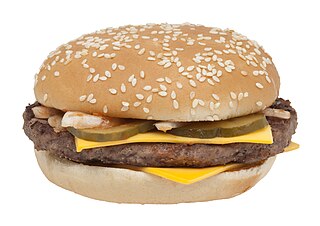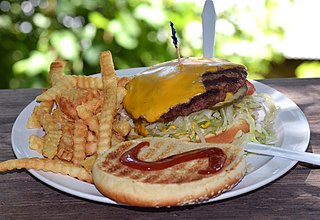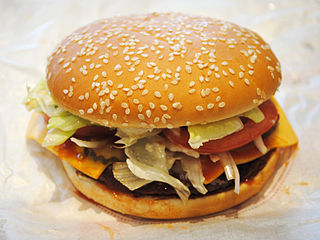
A hamburger, or simply burger, is a food consisting of fillings—usually a patty of ground meat, typically beef—placed inside a sliced bun or bread roll. Hamburgers are often served with cheese, lettuce, tomato, onion, pickles, bacon, or chilis; condiments such as ketchup, mustard, mayonnaise, relish, or a "special sauce", often a variation of Thousand Island dressing; and are frequently placed on sesame seed buns. A hamburger patty topped with cheese is called a cheeseburger.

A cheeseburger is a hamburger with a slice of melted cheese on top of the meat patty, added near the end of the cooking time. Cheeseburgers can include variations in structure, ingredients and composition. As with other hamburgers, a cheeseburger may include various condiments and other toppings such as lettuce, tomato, onion, pickles, bacon, avocado, mushrooms, mayonnaise, ketchup, and mustard.

"Where's the beef?" is a catchphrase in the United States and Canada, introduced as a slogan for the fast food chain Wendy's in 1984. Since then it has become an all-purpose phrase questioning the substance of an idea, event, or product.

The Big Mac is a hamburger sold by the international fast food restaurant chain McDonald's. It was introduced in the Greater Pittsburgh area in 1967 and across the United States in 1968. It is one of the company's flagship products and signature dishes. The Big Mac contains two beef patties, cheese, shredded lettuce, pickles, minced onions, and a Thousand Island-type dressing advertised as "special sauce", on a three-slice sesame-seed bun.

The Whopper is the signature hamburger and an associated product line sold by the international fast food restaurant chain Burger King and its Australian franchise Hungry Jack's. Introduced in 1957, the hamburger has undergone several reformulations, including changes to portion size and bread used. The hamburger is well known in the fast food industry, with Burger King advertising itself as "the Home of the Whopper" and naming its kiosk stores the BK Whopper Bar. In response to the Whopper, Burger King's competitors have developed similar products designed to compete against it.

A Luther Burger, or doughnut burger, is a hamburger or cheeseburger with one or more glazed doughnuts in place of the bun. These burgers have a disputed origin, and tend to run between approximately 800 and 1,500 calories.

The Big King sandwich is one of the major hamburger products sold by the international fast-food restaurant chain Burger King, and was part of its menu for more than twenty years. As of March 2019, it is sold in the United States under its 1997 Big King XL formulation. During its testing phase in 1996–1997, it was originally called the Double Supreme and was configured similarly to the McDonald's Big Mac—including a three-piece roll. It was later reformulated as a more standard double burger during the latter part of product testing in 1997. It was given its current name when the product was formally introduced in September 1997, but maintained the more conventional double cheeseburger format.

The BK Stacker sandwiches are a family of cheeseburgers sold by the international fast-food restaurant chain Burger King.
The Big Hardee is a hamburger sandwich offered by Hardee's. The original Big Hardee was introduced in 1995 and was designed to compete against McDonald's Big Mac or Burger King's Whopper. It debuted in a commercial with the Big Mac sandwich. It had a jingle that goes, "More meat, more cheese, less money. La la la la la."

The Baconator sandwich is a cheeseburger sold by the international fast-food restaurant chain Wendy's.
The Big Classic sandwich was a hamburger sold by the international fast-food restaurant chain Wendy's. The sandwich was intended to present a larger burger that appealed to the 18- to 36-year-old male demographic that desired a "heartier" product. It is one of only two named hamburger products sold by the company and was designed to compete against the Burger King Whopper sandwich.
McDonald's Corporation is the world's largest chain of fast food restaurants, serving around 68 million customers daily in 119 countries. McDonald's traces its origins to a 1940 restaurant in San Bernardino, California. After expanding within the United States, McDonald's became an international corporation in 1967, when it opened a location in Richmond, British Columbia, Canada. By the end of the 1970s, McDonald's restaurants existed in five of the Earth's seven continents; an African location came in 1992 in Casablanca, Morocco.

Wendy's is an American international fast food restaurant chain founded by Dave Thomas on November 15, 1969, in Columbus, Ohio. Its headquarters moved to Dublin, Ohio, on January 29, 2006. As of December 31, 2018, Wendy's was the world's third-largest hamburger fast-food chain with 6,711 locations, following Burger King and McDonald's. On April 24, 2008, the company announced a merger with Triarc Companies Inc., a publicly traded company and the parent company of Arby's. The merger was completed on September 29, 2008. Wendy's headquarters remained in Dublin. Following the merger, Triarc became known as Wendy's/Arby's Group, and later as the Wendy's Company following the sale of Arby's to Roark Capital Group.
A hamburger is a sandwich that consists of a cooked ground meat patty, usually beef, placed between halves of a sliced bun. Hamburgers are often served with various condiments, such as dill relish (condiment), mayonnaise, and other options including lettuce, tomato, onion, pickles, and cheese.

Burger King sliders, comprising several varieties of mini-sandwiches, are a series of sandwiches that have been sold by international fast-food restaurant chain Burger King since the 1980s. Burger Bundles was the first iteration, a set of three small hamburgers or cheeseburgers. These sandwiches were eventually replaced with a reformulated product called Burger Buddies that was sold in pairs. After a change in management in 2004, Burger Buddies were re-released as BK Burger Shots. The company has also sold several chicken and breakfast sandwich versions of these products.

The Big N’ Tasty is a hamburger sold by the international fast food chain McDonald's. It is designed to compete with the Whopper sandwich. A similar variation called the Big Tasty, without the center "N'", which was first released in Saudi Arabia, is sold outside the United States in parts of Europe, South America, South Africa, The Middle East, and Taiwan.
The Ciabatta Bacon Cheeseburger is a sandwich marketed and sold by Wendy's at its restaurants in the United States and Canada.













